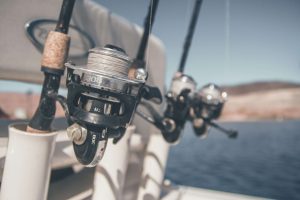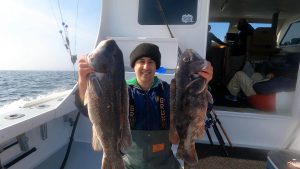
How to Choose the Perfect Reel for Your Next Trip
Choosing the right fishing reel can significantly impact your fishing experience, especially if you’re a beginner or intermediate angler. With various options available, it’s important
Knowing how to tie strong fishing knots is one of the most important skills for any angler. A well-tied knot ensures your hook or lure stays secure, giving you a better chance at landing that big fish you’ve been after. Here are five essential fishing knots every fishalot should master, along with their uses, pros, and cons.
This knot is literally called “The UNIVERSAL Fishing Knot.” This is a must know for all anglers, but can be especially valuable for beginners due to the fact that this knot can be used for every single inshore fishing application such as: tying your line to your spool; tying your line to lures or hooks; snelling your hooks; tying stopper knots; or even finishing line to line connection knots.
Best for: All fishing applications, line-to-line connections, terminal tackle, truly the universal knot.
Pros:
Cons:
This is a classic knot that most beginner fishalots will learn how to tie first. It’s simple and works well for most fishing situations.
Best for: Attaching hooks, swivels, and lures to monofilament or fluorocarbon lines
Pros:
Cons:
The Palomar knot is one of the easiest and strongest knots for securing hooks, lures, and swivels. It’s known for its simplicity and incredible strength making it a go-to knot for many anglers.
Best for: Works with any line securing hooks, lures, and swivels
Pros:
Cons:
The Figure of 8 Loop Knot is an excellent choice when you need a strong and secure loop at the end of your line. It’s commonly used for creating dropper loops, attaching leaders, or rigging lures and terminal tackle. This is one of the strongest and easiest loop knots you can tie.
Best for: Creating a secure loop for leaders, rigs, terminal tackle, and natural presentation for lures.
Pros:
Cons:
For connecting braided lines to fluorocarbon or monofilament leaders, the FG knot is the strongest and most reliable option. It has superior strength while maintaining a slim profile for easy casting.
Best for: Connecting braided mainline to fluorocarbon/monofilament leaders
Pros:
Cons:
Mastering these five knots will improve your fishing success by ensuring that all your knots are strong and reliable. Whether you’re tying on a lure, connecting different lines, or securing a hook, having the right knot for the job will make your fishing experience more effective and enjoyable. Practice these knots regularly, and they’ll become second nature on your next fishing trip.
You can view my entire knot guide here

Choosing the right fishing reel can significantly impact your fishing experience, especially if you’re a beginner or intermediate angler. With various options available, it’s important

Winter fishing can be one of the most rewarding experiences for anglers, with fewer crowds, stunning winter landscapes, and the chance to catch trophy-sized fish.